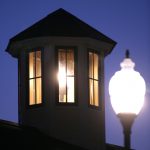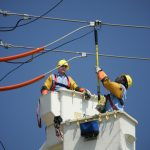Backflow Prevention
Protecting the Water Supply is Everyone’s Responsibility!
How many times have you put a garden hose in a bucket of soapy water to wash the car? Or sprayed insecticide with a garden hose sprayer? Or attached a hand spray attachment to the kitchen faucet to wash your hair or the dog? These seemingly harmless actions create cross-connections that could endanger the health and safety of you, your family and your neighbors.
The danger comes when the hose comes in contact with a harmful substance, if the pressure in the water main drops while the hose is submerged in contaminated water, then the water (and whatever’s in it) could be back siphoned into your pipes and the drinking water supply. Water pressure drops are not uncommon. They can occur when hydrants are opened to fight fires or during repairs to a broken water main.
When we use water from our faucets, we expect it will be free from contamination. Lafayette Utilities System Cross-Connection Control and Backflow Prevention Program helps prevent contaminated water and other unapproved substances from entering the public water system.
Remember “If you don’t want to drink it, don’t connect your water system to it.”
International Plumbing Code Backflow/Cross-Connection Control Requirements (PDF)
What is a Cross-Connection?
Cross-Connections are an actual or potential connection between a potable water supply and a non-potable source. The connection could allow contaminants or pollutants to enter the drinking water supply. Lafayette Consolidated Government has enacted Ordinance O-201-2017 requiring the elimination or the installation of approved backflow prevention assemblies for the control of cross-connections. View the Policy and Procedures document for more details.
What is Backflow?
Backflow as the undesirable reversal of flow of fluids, gases or other substances into a potable water distribution piping system as a result of a cross-connection.
Commercial-Industrial Requirements
In commercial or industrial situations, water often comes in contact with different types of hazardous substances for mixing, diluting, flushing or cleaning. State law requires that certain businesses be surveyed for potential cross-connections and that proper backflow prevention assemblies are installed to protect the public water supply.
If your business requires a survey, we will contact you for an appointment at your facility to identify specific hazards and discuss the applicable backflow prevention requirements.
• AIR GAP is required at facilities that handle sewage or radiological materials
• REDUCED PRESSURE ASSEMBLY is required for High Hazard locations
• DOUBLE CHECK VALVE ASSEMBLY is required for Low Hazard locations
Lawn Sprinkler Systems
Lawn sprinkler systems pose particular hazards because the heads are at ground level and subject to applications of fertilizers and pesticides and infiltration by parasites and bacteria. Without any type of protection, a backflow event could easily draw contaminates in through the sprinkler heads, through the irrigation piping system and into the potable water distribution system.
Depending on the type of irrigation system: Air Gaps, Vacuum Breakers (Pressure, hose or atmospheric depending on the application) or Reduced Pressure Assemblies is required to isolate the irrigation system from the potable water system.
BACKFLOW PROTECTION IS REQUIRED ON ALL IRRIGATION SYSTEMS
• Pressure vacuum breaker may be used for irrigation systems with no injector pumps.
• Reduced pressure assembly is required for irrigation systems with injector pumps.
A plumbing permit is required to install lawn irrigation sprinkler systems. Contact Lafayette Consolidated Codes Division at (337) 291-8461 to obtain permits.
Annual Testing Requirements
Backflow prevention assemblies do a great job of protecting the water supply. Regular maintenance and annual testing ensures backflow prevention assemblies are in proper working order because the springs, seats, rubber seals and other moving parts will wear out over time. Lafayette Utilities System requires backflow prevention assemblies to be tested on an annual basis.
Prices vary among testers. We suggest contacting several certified testers to obtain quotes for your test.
Click here to access the Backflow Prevention Assembly Test-Maintenance-Inspection Report.
If you have questions regarding the Cross-Connection Control and Backflow Prevention Program, contact Janalice Duplechien at (337) 291-5756 or jduplechien@lus.org.






